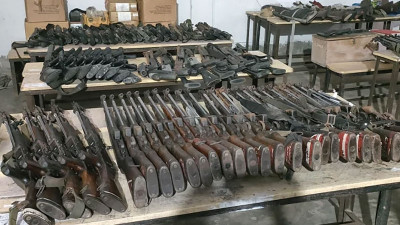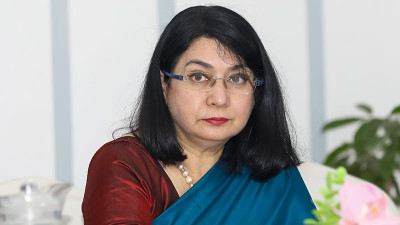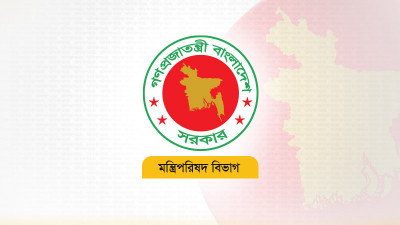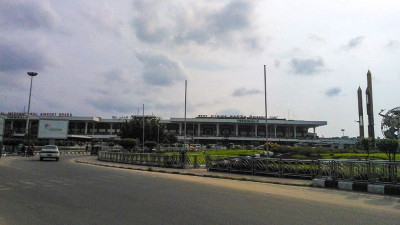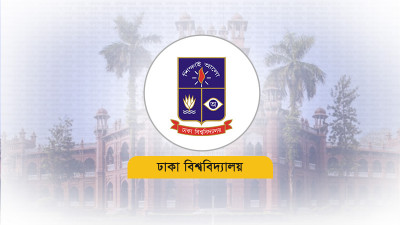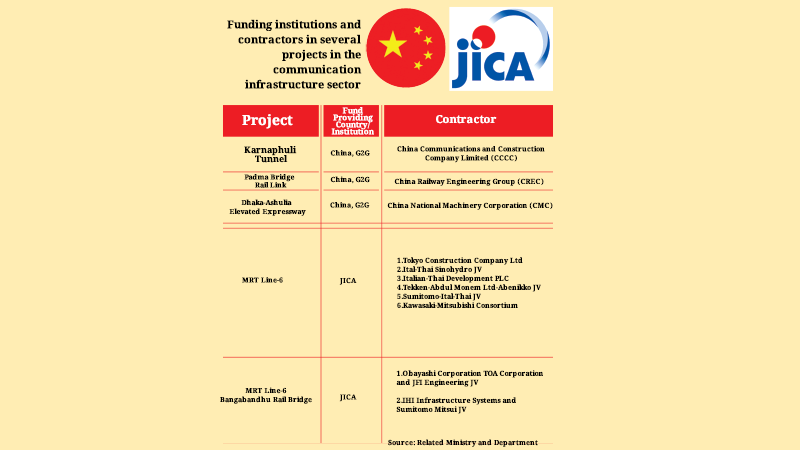 Photo: Bonik Barta
Photo: Bonik Barta The second rapid elevated road in the capital is the
Dhaka-Ashulia Elevated Expressway. This 24-kilometer-long elevated road has a
construction cost of BDT 175.53 billion. The project is being implemented with
a loan from China under a government-to-government (G2G) arrangement. Like
other G2G projects, no bidding process was followed for contractor selection.
The relevant authorities of China and Bangladesh appointed the China National
Machinery Corporation (CMC) as the contractor based on mutual agreement.
Experts in communication infrastructure believe that if
contractors had been appointed through a competitive bidding process instead of
the G2G method, the construction cost of the Elevated Expressway would have
been significantly lower. They point out that the Dhaka Elevated Expressway
project, which is similar and almost the same length, is being implemented for
BDT 89.4 billion under the Public-Private Partnership (PPP) model. In contrast,
the Dhaka-Ashulia Elevated Expressway project is expected to cost nearly double
that amount.
Not only is the high cost a concern, but the Ashulia
Expressway project has also come under scrutiny due to large commissions paid
under the guise of securing work. Even while still in the planning stage, the
contractor, CMC, signed a contract with Epic Solution in Bangladesh. The
agreement stipulated that Epic Solution would assist CMC in obtaining the work
in exchange for a 6 percent commission on the contract value, amounting to
approximately BDT 7.5 billion. Recently, allegations of breach of contract
between the two companies have brought this issue to light in court.
Infrastructure experts and economists have termed such G2G agreements "unethical"
and "unprecedented."
They argue that this kind of visible or invisible
commission trade is prevalent in nearly all projects in the country, benefiting
project officials as well as various levels of bureaucrats and politicians.
They believe that if project work were awarded through competitive bidding,
costs would decrease. Moreover, the method used to implement G2G projects is
largely unsuitable for a country like Bangladesh.
Regarding the matter, infrastructure expert and Professor
Dr. Hadiuzzaman of Bangladesh University of Engineering and Technology (BUET)
told Bonik Barta, "We often hear that there is an invisible commission
system in place from the government's Planning Commission to various
individuals and institutional levels for large projects in Bangladesh. Our
development partners are also likely aware of this. As a result, various types
of invisible commissions are often considered in the cost estimates of
projects, which effectively contributes to increasing project costs. When we
compare it with any neighboring country, whether it’s rail projects or road
construction, we see that the construction cost per kilometer in Bangladesh is
typically three to four times, or even more, than normal. In many cases, the
construction costs for such infrastructure in Bangladesh are even higher than
those in European countries."
He said, "In any infrastructure construction or
procurement, competitive bidding allows for work to be done at reasonable
prices. However, G2G projects do not allow for any opportunity for competitive
bidding. On the contrary, the lending country often adds various conditions to
implementing such projects, increasing costs. Almost everything is effectively
imposed on us by the lending country, contractors and consultants, machinery
used in construction, and construction materials. This raises project costs and
reduces opportunities for Bangladeshi contractors, consultants, and engineers.
Overall, I would say that implementing G2G projects is not justifiable in the
socioeconomic context of Bangladesh."
Another major project being implemented under the G2G
method in Bangladesh is the Padma Bridge Rail Link. The Railways Ministry is
spending BDT 392.46 billion on this project. Since it is a G2G project, no
bidding process was followed for contractor selection. Based on mutual
agreement, the China Railway Engineering Group (CREC) has been appointed as the
contractor. In terms of monetary value, this is the largest project in the
country's communication infrastructure sector. The railway construction cost
per kilometer in Bangladeshi currency exceeds BDT 2.3 million. Observations
from various international organizations have indicated that the Padma Bridge
Rail Link project is the most expensive among the various rail projects
(non-urban heavy rail projects) being constructed or completed in the
Asia-Pacific region.
Another project implemented using the G2G method is the
Karnaphuli Tunnel. The construction cost of the tunnel exceeds BDT 105 billion,
with China as the lending country. No bidding process was followed here either,
and the contractor appointed based on mutual agreement is China Communications
and Construction Company Limited (CCCC).
In addition to the G2G method, several projects have been
implemented in the country’s communication infrastructure sector with loans
from various development partner organizations. Many of these projects are
still ongoing. While the bidding process was followed for contractor selection
in these projects, experts disagree that the process can be considered
competitive.
Another professor from BUET, Dr. Shamsul Haque, cited
ongoing projects funded by the Japan International Cooperation Agency (JICA) as
examples. He said, "JICA has provided loans for various projects in
Bangladesh, including the metro rail and railway bridges. They have also acted
as consultants in each project, preparing the designs and cost estimates. They
have even prepared the bidding documents. In most projects, it has been
observed that certain conditions have been included in the call for bids that
only benefit institutions associated with JICA. As a result, these interested
parties end up winning the contracts. Ultimately, the competitiveness of the
bidding process is questionable."
Work on MRT Line-6, MRT Line-1, and MRT Line-5, Northern
Route of Dhaka, is currently underway with the funding of JICA. Apart from
these three metro rails, JICA is also financing an independent rail bridge
under construction parallel to the existing multi-purpose bridge on the Jamuna
River. Infrastructure experts are questioning the high construction cost of
these four mega projects. They also blame the non-competitive bidding process
in these projects as one of the reasons for the high price.
In addition to JICA, another major development partner in
Bangladesh is the Asian Development Bank (ADB). The organization is funding
several road and rail projects in the country. Other organizations have
financed various projects, including the World Bank, the Korea International
Cooperation Agency (KOICA), and the Asian Infrastructure Investment Bank
(AIIB). Neighboring India is also one of Bangladesh's key development partners.
Through India's Line of Credit (LOC), several projects in the communication
infrastructure sector have been implemented, with several more still ongoing.
Professor M. Mustafizur Rahman, a distinguished fellow at
the Centre for Policy Dialogue (CPD), commented that development partner
countries and organizations exert various pressures in the bidding processes of
projects implemented and ongoing in Bangladesh. He told Bonik Barta, "In
many cases, we see that the countries providing loans for development projects
in Bangladesh impose certain rules regarding procurement. For example, in
projects under India's Line of Credit (LOC), there is a condition to source 65%
of construction materials from India. We have often observed deviations from
various procurement rules, and there are reports of corruption as well. Due to
these factors, the construction cost increases, and there are also allegations of
compromises in the quality of work."
He said, "In Bangladesh, the bidding process has
been largely made online, with many regulations added. However, we often see
deviations from these rules. The bidding process does not happen in the
competitive manner it is supposed to. Only a few firms can participate in the
bidding process. If we cannot break free from these issues, we will suffer in
the future just as we have in the past."
Most projects in the country's communication
infrastructure sector are implemented under the Ministry of Road Transport and
Bridges and Railways. Responsible officials from these two ministries did not
wish to comment on the lack of competitive bidding in contractor selection.

